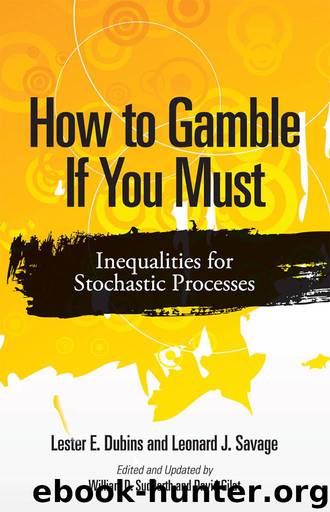How to Gamble If You Must: Inequalities for Stochastic Processes (Dover Books on Mathematics) by Dubins Lester E. & Savage Leonard J

Author:Dubins, Lester E. & Savage, Leonard J. [Dubins, Lester E.]
Language: eng
Format: azw3
Publisher: Dover Publications
Published: 2014-08-03T16:00:00+00:00
belongs to υ°, and γυ = 0.
(e) If υ is unbounded from below, there is, for every f, a two-point gamble γ in υ° with γ{f} arbitrarily close to 1.
(f) If υ is bounded from below, z = inf υ ≤ 0, and υ(g) > 0, then
and, for all γ ∈ υ° and ,
Of course, each part of Theorem 1 has practical implications for a gambler constrained to choose a gamble from υ°. For example, part (e) shows that, if υ is unbounded from below and the gambler’s utility u is bounded, then the gambler can practically have his heart’s desire with a single two-point gamble in υ°. Part (f) bounds what he can achieve in υ° when υ is bounded from below.
If υ ≤ aw for some nonnegative constant a, then γw ≤ 0 plainly implies that γυ ≤ 0; in short, υ° ⊃ w°, or υ is as permissive as w. Similarly, if υ = aw for some positive a, then υ° = w°; υ and w permit the same gambles. Several paragraphs lead to the next two theorems asserting almost the converses of these facts.
Evidently, from part (a) of Theorem 1, if w ≤ 0, then υ° ⊃ w° if and only if υ ≤ 0. The condition that υ ≤ 0 can, though artificially, be written υ ≤ 0w.
Suppose, for completeness, that w is nowhere negative. Then γw ≤ 0 if and only if γ{f: w(f) > δ} = 0 for each positive δ. If for each positive there is a positive δ such that implies w(f) > δ, then γw ≤ 0 implies γυ ≤ 0, or υ° ⊃ w°. Conversely, if, for some f, υ(f) > 0 and w(f) = 0, δ(f) is in w° but not in υ°; similarly, if there is a sequence of distinct fortunes fi with w(fi) ≤ i−1 but , a diffuse gamble on the sequence {fi} belongs to w° but not to υ°. In summary, if w is nowhere negative, then υ is as permissive as w if and only if, for every positive , there is a positive δ such that implies w(f) > δ. (When discussion is restricted to countably additive γ on some sigma-field with respect to which υ and w are measurable, it is necessary and sufficient that υ(f) > 0 imply w(f) > 0.)
Example 1. On [0, 1], let u(f) = f(1 − f), υ(f) = f2, and w(f) = 0 or 1 according as f is 0 or positive. Then u° ⊃ υ° ⊃ w°, and neither inclusion can be reversed (though, in a countably additive setting, the second one could be). In this example there is no nonnegative a for which u ≤ aυ.
Suppose, finally, that the two sets of fortunes, F+ where w(f) is positive and F− where it is negative, are both nonvacuous. For any fortunes f+ and f− in F+ and F−, consider that two-point gamble γ carried by those two fortunes for which γw = 0. A necessary condition for υ° ⊃ w° is that γυ ≤ 0.
Download
This site does not store any files on its server. We only index and link to content provided by other sites. Please contact the content providers to delete copyright contents if any and email us, we'll remove relevant links or contents immediately.
| Biomathematics | Differential Equations |
| Game Theory | Graph Theory |
| Linear Programming | Probability & Statistics |
| Statistics | Stochastic Modeling |
| Vector Analysis |
Weapons of Math Destruction by Cathy O'Neil(5027)
Factfulness: Ten Reasons We're Wrong About the World – and Why Things Are Better Than You Think by Hans Rosling(4010)
Factfulness_Ten Reasons We're Wrong About the World_and Why Things Are Better Than You Think by Hans Rosling(2750)
Descartes' Error by Antonio Damasio(2725)
A Mind For Numbers: How to Excel at Math and Science (Even If You Flunked Algebra) by Barbara Oakley(2685)
TCP IP by Todd Lammle(2632)
Applied Predictive Modeling by Max Kuhn & Kjell Johnson(2470)
Fooled by Randomness: The Hidden Role of Chance in Life and in the Markets by Nassim Nicholas Taleb(2407)
The Book of Numbers by Peter Bentley(2398)
The Tyranny of Metrics by Jerry Z. Muller(2396)
The Great Unknown by Marcus du Sautoy(2178)
Once Upon an Algorithm by Martin Erwig(2140)
Easy Algebra Step-by-Step by Sandra Luna McCune(2110)
Practical Guide To Principal Component Methods in R (Multivariate Analysis Book 2) by Alboukadel Kassambara(2087)
Lady Luck by Kristen Ashley(2067)
Police Exams Prep 2018-2019 by Kaplan Test Prep(2025)
Linear Time-Invariant Systems, Behaviors and Modules by Ulrich Oberst & Martin Scheicher & Ingrid Scheicher(1980)
All Things Reconsidered by Bill Thompson III(1955)
Secrets of Creation, Volume 1: The Mystery of the Prime Numbers by Watkins Matthew(1857)
